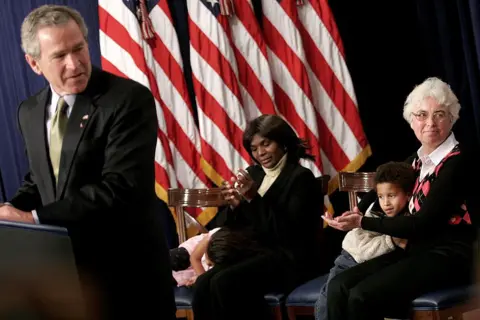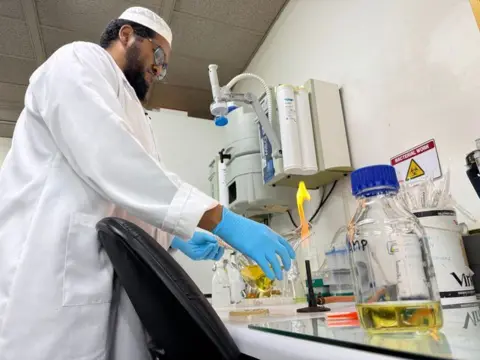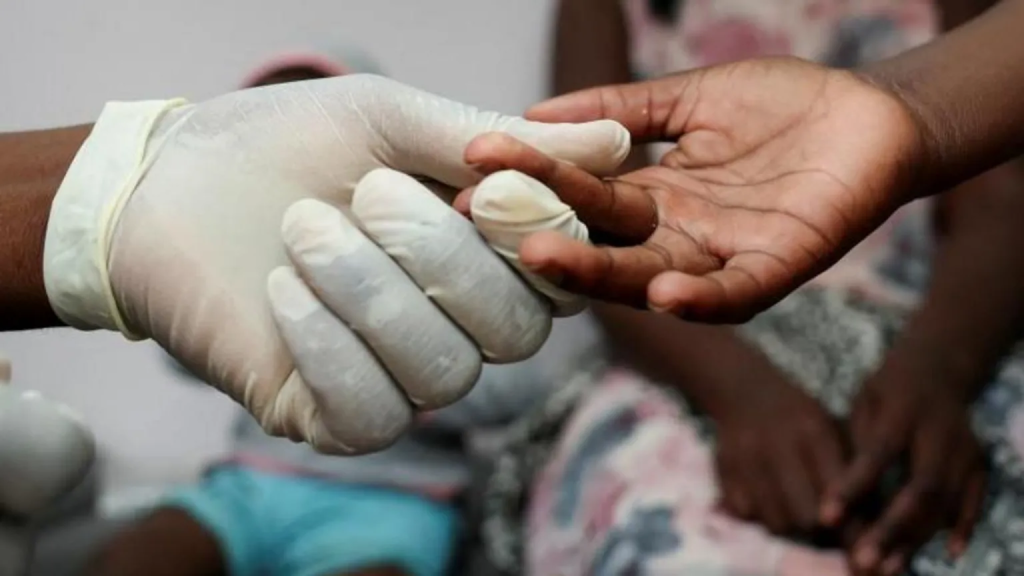Gugu used to collect her antiretrovirals from a USAID-funded clinic in downtown Johannesburg.
But when President Trump’s cuts to aid funding were announced earlier this year, she and thousands of other HIV-positive patients across South Africa suddenly faced an uncertain future.
Gugu was lucky, the clinic where she got the medication that helps suppress her symptoms contacted her before it closed down.
“I was one of the people who was able to get their medication in bulk. I usually collect a three-month prescription. But before my clinic closed, they gave me nine months’ worth of medication.”
She will run out of antiretrovirals (ARVs) in September, and then plans on going to her local public hospital for more.
A former sex worker, the 54-year-old found out she was HIV-positive after she’d quit the industry.
Ten years ago, she got a chesty cough and initially thought it was tuberculosis. She went to a doctor who told her she had a chest infection and treated her for it.
But when the treatment failed, she went to a clinic to get an HIV test.
“By then, I already assumed that I was HIV-positive, and I told the nurse this.”
She was right, and she has been on ARVs ever since. We’re not using her real name at her request.
She currently works as a project coordinator for an NGO.
“We help pregnant sex workers get their ARVs, to ensure their children are born HIV-negative. We also do home visits to make sure that the mothers take their medication on time, and to look after their babies when they go for their monthly check-ups.”
Many HIV-positive sex workers in South Africa relied on private clinics funded by the US government’s now-defunct aid agency, USAID, to get their prescriptions and treatments.
But most of the facilities closed after US President Donald Trump cut most foreign aid earlier this year.
In a report due to be released on Thursday, the UN body in charge of fighting HIV/Aids does not single out the US, but says that drastic cuts from a number of donors have sent shockwaves around the world, and the “phenomenal progress” in tackling the illness risks being reversed.
“New HIV infections have been reduced by 40% since 2010, and 4.4 million children have been protected from acquiring HIV since 2000. More than 26 million lives have been saved,” UNAIDS says, warning that if the world does not act, there could be an extra six million new HIV infections and four million AIDS-related deaths by 2029.
Gugu believes that many sex workers could be discouraged from going to public hospitals for their HRVs..
“The problem with going to public hospitals is the time factor. In order to get serviced at these facilities, you have to arrive at 4 or 5am, and they may spend the whole day waiting for their medication. For sex workers, time is money,” Gugu says.
She adds that she recently went to her local clinic with some friends to register her details and build a relationship with staff.
“The nurse who attended to us was very rude. She told us there was nothing special about sex workers.”
She thinks this could lead to many sex workers defaulting on their medication, “especially because their hospital files contain a lot of personal information, and the concern is that sometimes the nurses at these local clinics aren’t always the most sensitive in dealing with this kind of information.”
According to the UN, the US cuts to HIV funding could reverse some of the gains made by what has been called one of the most successful public health interventions in history.
Scientists in the UK-based Lancet medical journal last month estimated that USAID funding directly reduced Aids deaths by 65%, or 25.5 million, over the past two decades.

Then-US President George W Bush launched an ambitious programme to combat HIV/Aids in 2003, saying it would serve the “strategic and moral interests” of the US.
Known as the President’s Emergency Plan for Aids Relief (Pepfar), it led to the investment of more than $100bn (£74bn) in the global HIV/Aids response – the largest commitment by any nation to address a single disease in the world.
South Africa has about 7.7 million people living with HIV, the highest number in the world, according to UNAIDS.
About 5.9 million of them receive antiretroviral treatment, resulting in a 66% decrease in Aids-related deaths since 2010, the UN agency adds.
South Africa’s government says Pepfar funding contributed about 17% to its HIV/Aids programme. The money was used for various projects, including running mobile clinics to make it easier for patients to get treatment.
The Trump administration’s cuts have raised concern that infection rates could spike again.
“I think we’re going to start seeing an increase in the number of HIV infections, the number of TB cases, the number of other infectious diseases,” Prof Lynn Morris, Deputy Vice-Chancellor of Johannesburg’s Wits University, tells the BBC.
“And we’re going to start seeing a reversal of what was essentially a real success story. We were getting on top of some of these things.”
Gugu points out that treatment is a matter of life and death, especially for vulnerable populations like sex workers.
“People don’t want to default on their ARVs. They’re scared that they’re going to die if they don’t get access to them.
The cuts have also affected research aimed at finding an HIV vaccine and a cure for Aids.
“There’s the long-term impact, which is that we’re not going to be getting new vaccines for HIV,” Prof Morris adds.
“We’re not going to be keeping on top of viruses that are circulating. Even with new viruses that might appear, we’re not going to have the surveillance infrastructure that we once had.”
South Africa has been one of the global leaders in HIV research. Many of the medications that help prevent the virus, and which have benefited people around the world, were trialled in South Africa.
This includes Prep (pre-exposure prophylaxis), a medication which stops HIV-negative people from catching the virus.
Another breakthrough preventive drug released this year, Lenacapavir, an injection taken twice a year and that offers total protection from HIV, was also tried in South Africa.

In a lab at Wits University’s Health Sciences campus, a small group of scientists are still working on a vaccine for HIV.
They are part of the Brilliant Consortium, a group of labs working across eight African countries to develop a vaccine for the virus.
“We were developing a vaccine test to see how well that works, and then we would trial it on humans,” Abdullah Ely, an Associate Professor at Wits University, tells the BBC in his lab.
“The plan was to run the trials in Africa based on research carried out by Africans because we want that research to actually benefit our community as well as all mankind.”
But the US funding cuts threw their work into doubt.
“When the stop order came, it meant we had to stop everything. Only some of us have been able to get additional funding so we could continue our work. It’s set us back months, probably could even be a year,” Prof Ely says.
The lab lacks funding to carry out clinical trials scheduled for later this year.
“That is a very big loss to South Africa and the continent. It means that any potential research that comes out of Africa will have to be tested in Europe or the US,” Prof Ely says.
In June, universities asked the government for a bailout of 4.6bn South African rand ($260m; £190m) over the next three years to cover some of the funding lost from the US.
“We are pleading for support because South Africa is leading in HIV research, but it’s not leading for itself. This has ramifications on the practice and policies of the entire globe,” says Dr Phethiwe Matutu, head of Universities South Africa.
South Africa’s Health Minister Aaron Motsoaledi announced on Wednesday that some alternative funding for research had been secured.
The Bill and Melinda Gates Foundation and the Wellcome Trust have agreed to donate 1m rand each with immediate effect, while the government would make available 400m rand over the next three years, he said.
This would bring the total to 600m rand, way below the 4.6bn rand requested by researchers.
As for Gugu, she had hoped that by the time she was elderly, a cure for HIV/Aids would have been found, but she is less optimistic now.
“I look after a nine-year-old. I want to live as long as I can to keep taking care of him,” she tells the BBC.
“This isn’t just a problem for right now, we have to think about how it’s going to affect the next generation of women and young people.”
DISCLAIMER: The Views, Comments, Opinions, Contributions and Statements made by Readers and Contributors on this platform do not necessarily represent the views or policy of Multimedia Group Limited.
DISCLAIMER: The Views, Comments, Opinions, Contributions and Statements made by Readers and Contributors on this platform do not necessarily represent the views or policy of Multimedia Group Limited.


